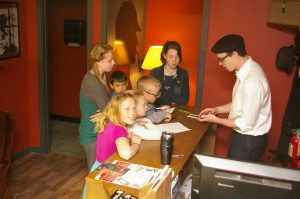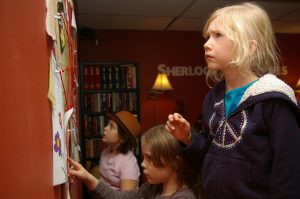An escape room is a themed room where teams of people must work together to escape the room within a certain allotted time frame. Rooms are themed based on various scenarios and locations. The team must work together to solve puzzles, clues, and riddles. Three areas that can be improved using escape rooms are problem solving, memory, and teamwork.
Problem Solving
Parenting is a task that changes in difficulty as children grow up. One important skill that can minimize the difficulty is problem-solving, especially for kids 8-12 years of age, which is when their brains are changing and learning how to adapt to unfamiliar environments (ie. sleep-overs, camps, extracurricular activities, etc). The use of an escape room to aid in the development of this ability enables the child a chance to improve thinking abilities leading to better cognition, and also better grades. Creativity is another advantage that can be achieved by finding new and different solutions to the dilemma at hand. One final area that can be developed is that of decision making: the child or adolescent must choose the best and correct answer to the test.
Memory
An escape room can aid children in learning memory skills. Parents can view improved grades in school on tests and quizzes. Youth will experience a reduction in anxiety and stress as they begin to remember more. One more advantage that the escape room allows is improvements in concentration, which is linked to memory, as the structure of the game encourages focusing on the situation at hand. The puzzles, riddles, and clues required to complete the room will have children using their complete brain to develop solutions which exercises the brain and improves memory.
Teamwork
Parenting takes teamwork between children and parents. An escape room will enhance the teamwork capabilities that the child will require throughout their life. Some of these abilities include self-confidence, listening, bonding and reliance. Self-confidence among all those in a family or even among a group of friends can be developed and improved by requiring each member to work together toward a solution. Teams can support each other to help boost confidence. Listening skills are required to complete the escape room scenarios. Each member is required to participate and offer suggestions that can be attempted to succeed in completing the room. Bonding is another benefit of teamwork. The team learns to bond by counting on each member to participate. Another teamwork skill that can be obtained is that of reliance. The child will learn to rely on others for help so that they can all escape.

Children and adolescents learning to develop and improve their cognitive skills will discover that escape rooms as a great alternative to typical book work. The room offers a variety of clues, puzzles, and riddles to those that are trying to find solutions to the situation presented. For anyone who is parenting youth as they age, they will discover that school grades will also be enhanced as a result of this sort of regular “brain gym.” These skills will aid children throughout their lives and ensure success.




